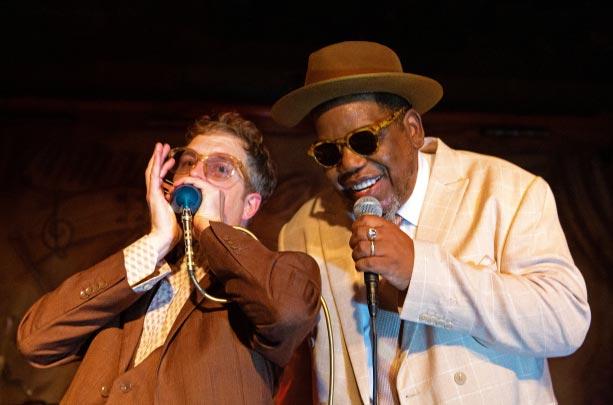
2 minute read
The Cash Box Kings
Roll, Soul, and R&B. Those came directly out of the Blues.
Rock And Blues International: Well, you mentioned The Stones and you mentioned Clapton. A great deal of the British Blues scene was merely the Black American Blues scene being reinterpreted by the British musicians. They simply took the old Blues songs and re-recorded them. At that time a good deal of the American musicians had seemed to forgotten or overlooked them. They listened to the English Blues and all of a sudden they started emulating what the British musicians were doing. It opened up a whole new world for them. What do you thing the British musicians had going for them that inspired the white musicians of America to start looking at the Blues again?
Advertisement
Joe Nosek: Well that’s a really good question. There were definitely white musicians here… I’m thinking Charlie Musselwhite, Paul Butterfield, and Canned Heat. Those were some really good musicians around the same time doing the same thing, but not if you consider the population of the U.S. compared to the population of
(continued from previous page)
Great Britain, a small island, and the amount of bands that came out of there. It wasn’t the same. I don’t know what it was… honesty, if the records were more readily available, that they were just so new and novel to them. I guess sometimes you tend not to notice and you take for granted things that are right in your backyard. That’s what was going on here in the U.S. It’s a really good question. But, I agree with you. Later on we had the Claptons. When I was first starting out it was really hard for me to find any young musicians who wanted to play Blues who’s knowledge of the Blues has barely gone past Clapton and Stevie Ray Vaughan. They’re like ‘listen to this Stevie Ray Vaughan lick I learned,’ and yeah, you might have learned it from a Stevie Ray Vaughan record, but that’s Albert King. Stevie took that directly from Albert King and he’d be the first one to admit it. So I was always trying to help my buddies who really liked Eric Clapton or Stevie Ray Vaughan learn who their influences were, like BB, Freddie, and Albert King and some other guys like that.
Rock And Blues International: On this album, you give a nod to some Blues greats as well, Sonny Boy Williamson and Muddy Waters. What made you pick those songs in particular. You’ve included “Please Have Mercy” and “Pontiac Blues.”
Joe Nosek: We primarily write our own material for recording, but we also… as you said… give a nod to some of the originators that we revere. I think Muddy and Sonny Boy are on the top of that list. We try to do and pick songs too that aren’t warhorses that everyone does. We try to stay away from the “Sweet Home Chicago” and “Hoochie Coochie Man” type of songs. The Sonny Boy Williamson one, the Sonny Boy song that we did, “Pontiac Blues.” You don’t hear too many people doing that. It’s one of his earlier songs and it’s one that Oscar really dug as a young man. We started just doing that live one night. “Do you know “Pontiac Blues” by Sonny Boy” and it was “Yeah, I know that.” We played that and it went pretty well, so we did that again. So, we decided to record that one and Muddy… Muddy’s probably… if you had to chose one artist you really embodied, that post war Chicago sound continued on next page







